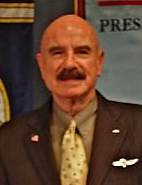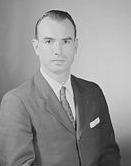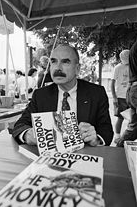
| G. Gordon Liddy | |
 |
|
| Born |
George Gordon Battle Liddy November 30, 1930 (age 82) Hoboken, New Jersey |
| Charge(s) | Conspiracy, burglary, illegalwiretapping |
| Penalty | 20 year imprisonment, later commuted to 8 years by President Jimmy Carter |
| Conviction status | Released when parole came up after 4.5 years in prison |
| Occupation | Army officer kept stateside during Korean War, Lawyer,FBI agent, politician, radio personality, actor. |
| Spouse | Frances Liddy (deceased) |
| Parents | Sylvester J. Liddy and Maria Liddy |
| Children | Alexandra Bourne; Grace Liddy; Commander James Gordon Liddy USN (SEAL) (Ret.); Thomas Liddy; and Colonel Raymond Joseph Liddy, USMCR |
George Gordon Battle Liddy (born November 30, 1930), known as G. Gordon Liddy, was the chief operative for the White House Plumbers unit that existed from July–September 1971, during Richard Nixon's presidency. Separately, along with E. Howard Hunt, Liddy organized and directed the Watergate burglariesof the Democratic National Committee headquarters in the Watergate building in May and June 1972. After five of Liddy's operatives were arrested inside the DNC offices on June 17, 1972, subsequent investigations of the Watergate scandal led to Nixon's resignation in 1974. Liddy was convicted of burglary,conspiracy and refusing to testify to the Senate committee investigating Watergate. He served nearly fifty-two months in federal prisons.[1]
Liddy later joined with Timothy Leary for a series of popular debates on various college campuses, and similarly worked with Al Franken in the late 1990s. From 1992 to 2012[2] Liddy served as a radio talk show host. His radio show as of 2009 was syndicated in 160 markets by Radio America and on both Sirius Satellite Radio and XM Satellite Radio stations in the United States.[3] He has been a guest panelist for Fox News Channel in addition to appearing in a cameo role or as a guest celebrity talent in several television shows.
Early years
Youth, family, education

Liddy, c. 1964
Liddy was born in Brooklyn, New York,[4] to Sylvester James Liddy and Maria Liddy; his maternal grandfather was of Italian descent. Liddy was raised in Hoboken[5] and West Caldwell, New Jersey. He was named for George Gordon Battle, a New York City attorney andTammany Hall DA nominee who had mentored Liddy's father.
Liddy spent grades 1 through 3 at the Academy of the Sacred Heart. He was enrolled in the fourth grade at SS. Peter and Paul Parochial School. He was enrolled in St. Aloysius Parochial School where he entered the sixth grade in September 1941. In 1944, Liddy graduated from St. Aloysius. In September 1944 Gordon Liddy entered Saint Benedict's Preparatory School in Newark, New Jersey, and graduated in June 1948 at the age of 17.
College, military, law school
He was educated at Fordham University, graduating in 1952. Following graduation, Liddy joined the United States Army, serving for two years as an artillery officer during the Korean War. He remained stateside for medical reasons. He returned to New Jersey in 1954 to attend Fordham University School of Law, earning a position on the Fordham Law Review. After graduating from law school in 1957, he went to work for the Federal Bureau of Investigation (FBI) under J. Edgar Hoover. His work at the agency prompted a supervisor to describe him as "a wild man" and a "superklutz".[6]
FBI, prosecutor, political runs
At age 29, Liddy became the youngest[citation needed] Bureau Supervisor at FBI national headquarters in Washington, D.C., earning multiple commendations from Hoover.[citation needed] He left the FBI in 1962 to practice international law in Manhattan.
Liddy worked as a lawyer in New York City and a prosecutor in Dutchess County, New York. In 1966, he organized the arrest and unsuccessful trial of Timothy Leary. As an assistant district attorney, he once fired a pistol into the courtroom ceiling during jury summation.[6] He ran unsuccessfully for the post of District Attorney and then for the United States House of Representatives in 1968 (losing the Republican primary narrowly to Hamilton Fish IV), but used his political profile to run the presidential campaign of Richard Nixon in the 28th district of New York.
White House undercover operative
In 1971, after serving in several positions in the Nixon administration, Liddy was moved to Nixon's 1972 campaign, the Committee to Re-elect the President (officially known as CREEP), in order to extend the scope and reach of the White House "Plumbers" unit, which had been created in response to various damaging leaks of information to the press. His formal title at CREEP was legal counsel.
At CREEP, Liddy concocted several plots in early 1972, collectively known under the title "Operation Gemstone". Some of these were far-fetched, intended to embarrass the Democraticopposition.[7] These included kidnapping anti-war protest organizers and transporting them to Mexico during the Republican National Convention (which at the time was planned for San Diego), as well as luring mid-level Democratic campaign officials to a house boat in Baltimore, where they would be secretly photographed in compromising positions with prostitutes. Most of Liddy's ideas were rejected by Attorney General John N. Mitchell, but a few were given the go-ahead by Nixon Administration officials, including the 1971 break-in at Daniel Ellsberg's psychiatrist's office inLos Angeles. Ellsberg had leaked the Pentagon Papers to The New York Times.[8] At some point, Liddy was instructed to break into the Democratic National Committee offices in the Watergate Complex.
Watergate burglaries
Main article: Watergate burglaries
Liddy was the Nixon Administration liaison and leader of the group of five men who broke into the headquarters of the Democratic National Committee at the Watergate Complex. At least two separate entries were made in May and June 1972; the burglars were caught and apprehended on June 17.[9] The purposes of the break-in were never conclusively established. The burglars sought to place wiretaps and planned to photograph documents. Their first attempt had led to improperly-functioning recording devices being installed. Liddy did not actually enter the Watergate Complex; rather, he admitted to supervising the second break-in from a room in the adjacent Watergate Hotel.
For this, which he coordinated with E. Howard Hunt, Liddy was convicted of conspiracy, burglary and illegal wiretapping.[10] Liddy was sentenced to a 20-year prison term and was ordered to pay $40,000 in fines. He began serving the sentence on January 30, 1973. On April 12, 1977, President Jimmy Carter commuted Liddy's sentence to eight years, "in the interest of equity and fairness based on a comparison of Mr. Liddy's sentence with those of all others convicted in Watergate related prosecutions", leaving the fine in effect.[11] Carter's commutation made Liddy eligible for parole as of July 9, 1977. Liddy was released on September 7, 1977, after serving a total of four and a half years of actual incarceration.
After prison

G. Gordon Liddy at the Miami Book Fair International of 1990
In 1980, Liddy published an autobiography, titled Will, which sold more than a million copies and was made into a television movie. In it he states that he once made plans with Hunt to kill journalist Jack Anderson, based on a literal interpretation of a Nixon White House statement "we need to get rid of this Anderson guy".[12][13] In the mid-1980s Liddy went on the lecture circuit and was listed as the top speaker in the college circuit in 1982 by The Wall Street Journal. He later joined with LSDproponent Timothy Leary on a series of debates which were popular on the college circuit as well; Leary had once been labeled by Liddy's ex-employer Richard Nixon as "the most dangerous man in America." Liddy remained in the public eye with two guest appearances on the 1984-89 television series Miami Vice, playing the role of "Capt. Real Estate," a character loosely based on himself. In Miami Vice, he acted with John Diehl, who would later go on to portray Liddy himself in Oliver Stone's 1995 movie Nixon, making him one of the few actors who have acted with their own portrayers. Liddy's other TV guest credits include Airwolf, MacGyver and the short-lived The Highwayman. Comic book author Alan Moore has stated that the character of The Comedian (Edward Blake) from his graphic novel Watchmen was based in part on Liddy. In the 1979 TV adaptation of John Dean's book "Blind Ambition", Liddy was portrayed by William Daniels.
In the early 1980s Liddy joined forces with former Niles, Illinois Police Officer and co-owner of The Protection Group, Ltd., [1] Thomas E. Ferraro, Jr., to start up a private security and countersurveillance firm called, G. Gordon Liddy & Associates. The firm was not a success, however, and it filed for bankruptcy on November 12, 1988.[14]
In 1992, Liddy emerged to host his own talk radio show. Less than a year later, its popularity led to national syndication through Viacom's Westwood One Network and later on, Radio America, in 2003. Liddy's show ended July 27, 2012.[2][2]
In addition to Will the nonfiction books When I Was a Kid, This Was a Free Country (2002), Fight Back! Tackling Terrorism, Liddy Style (2006, with his son[15] Cdr. James G. Liddy, J. Michael Barrett and Joel Selanikio), Liddy has published two novels: Out of Control (1979) The Monkey Handlers (1990).
Controversial statements
August 26, 1994: Now if the Bureau of Alcohol, Tobacco and Firearms comes to disarm you and they are bearing arms, resist them with arms. Go for a head shot; they're going to be wearingbulletproof vests." … "They've got a big target on there, ATF. Don't shoot at that, because they've got a vest on underneath that. Head shots, head shots.... Kill the sons of bitches. [16]
September 15, 1994: If the Bureau of Alcohol, Tobacco and Firearms insists upon a firefight, give them a firefight. Just remember, they're wearing flak jackets and you're better off shooting for the head. [17]
Liddy claimed that his detractors omit some important context:
“ I was talking about a situation in which law enforcement agents come smashing into a house, don't say who they are and their guns are out, they're shooting and they're in the wrong place. This has happened time and time again. The ATF has gone in and gotten the wrong person in the wrong place. The law is that if somebody is shooting at you, using deadly force, the mere fact that they are a law enforcement officer, if they are in the wrong, does not mean you are obliged to allow yourself to be killed so your kinfolk can have a wrongful death action. You are legally entitled to defend yourself and I was speaking of exactly those kind of situations. If you're going to do that, you should know that they're wearing body armor so you should use a head shot. Now all I'm doing is stating the law, but all the nuances in there got left out when the story got repeated.[17] ”
Acting career
G. Gordon Liddy has acted in several films, including Street Asylum, Camp Cucamonga, Adventures in Spying, and Rules of Engagement. He appeared in the television shows The Highwayman, Airwolf,Fear Factor, 18 Wheels of Justice, Perry Mason, and MacGyver, had a recurring role on Miami Vice, and guest starred in Al Franken's TV show LateLine. On April 7, 1986 Liddy appeared atWrestleMania II as a guest judge for a boxing match between Mr. T (with Joe Frazier, The Haiti Kid) versus Roddy Piper (with Bob Orton and Lou Duva).
Liddy appeared on a celebrity edition of the NBC TV show Fear Factor, the show's series finale, on September 12, 2006 (filmed in November, 2005). At 75 years of age, Liddy was the oldest contestant ever to appear on the show. Liddy beat the competition in the first two stunts, winning two motorcycles custom built by Metropolitan Chopper. In the final driving stunt, Liddy crashed and was unable to finish.
Liddy is one of the many people interviewed in the documentary The U.S. vs. John Lennon
He was also a commercial spokesman for Rosland Capital selling gold in television commercials.



















